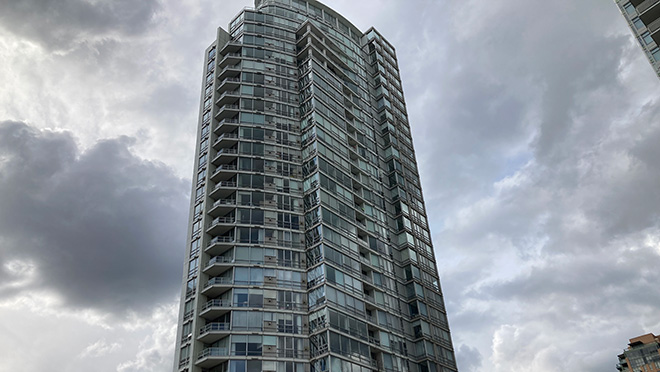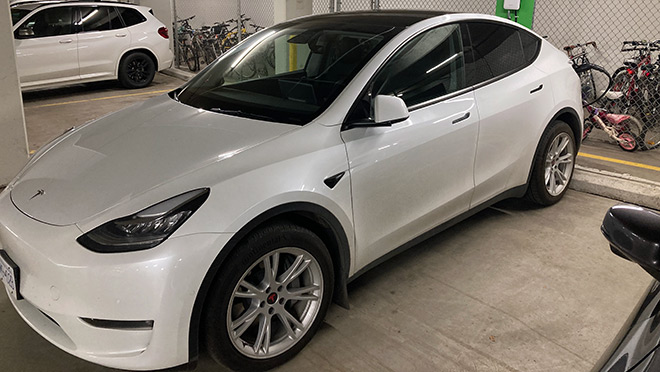EVs & apartments: One strata's path to adding charging

Yaletown building leans on CleanBC rebates to add charging for residents
Dave Wong doesn't own an electric car and would hardly call himself an EV expert. But his experience in helping deliver EV charging in the underground parking area of the Yaletown apartment building he lives in provides invaluable insights for other stratas in B.C.
And in his mind, the first matter of business is starting the conversation as early as possible. The more residents know about the options and benefits around adding EV charging, the better the chances of getting the vote by owners to make it happen.
"You can't just spring this on your constituents," says Wong, who took the lead on the EV charging project as a member of the strata council of the Peninsula, which is literally a stone's throw from boats moored in Yaletown's marina. "There has to be an educational process. People need to be on board before you go for a vote at a general meeting, or the whole thing breaks down."
And they do break down. As part of his homework in the lead-up to pitching the project to residents, Wong learned that EV charging plans in several neighbouring buildings had stumbled, and in several cases, been all but abandoned. Wong initially got plenty of initial pushback from residents in his building, too.
"A big voting bloc in our building is older people, and they told us things like 'We don't have a car and we don't care'," recalls Wong. "They asked us 'Why should I spend the money?' And the answer to that is essentially, if every building around you eventually gets EV charging and you don't have it, your home's value will suffer."
In the fall of 2020, Wong and his strata started looking into EV charging in their building, which was built in 1997, long before infrastructure and wiring for EV readiness to 100% of individual parking stalls in new buildings was made a bylaw in Vancouver. By the spring of 2022, the strata had used CleanBC EV Ready incentives to deliver wiring to one stall per apartment – and 20 residents have gone the next step in paying $3,500 for the purchase and installation of chargers in their parking spots.
"It amazed us that 20 people signed up for actually installing chargers," he says. "I had counted what I thought were five electric vehicles in the building, but there were actually only three. We're now up to five in the building, so a bunch of people are either looking at buying an EV or are future-proofing by installing chargers now."
CleanBC EV Ready rebates of up to $3,000 are available for the creation of an EV Ready plan, and up to $120,000 per project is available for the installation of EV Ready electrical infrastructure (up to a maximum of $600 per stall). For the purchase and installation of Level 2 networked chargers, up to $14,000 is also available.

Tale of an EV charging retrofit, step by step
As the strata council member assigned to handle mechanical, electrical, and some structural issues and projects at the Peninsula condo complex, Wong was tasked with exploring what it might take, and what it might cost, to deliver EV charging in the building's parking areas.
Wong did his homework, which included:
- Contacting three different EV charging providers, and getting "back of the envelope" ballpark cost estimates from each.
- Visiting several multi-unit condo buildings that had added EV charging.
- Chatting with other stratas in the neighbourhood that were trying to add EV parking.
"That education told me that these efforts almost always fail on the first try," he says. "I discovered that one building nearby had a plan rejected in a vote by members. And in another, the process got bogged down so badly that they haven't even tried for a vote yet."
Wong didn't want that to happen at the Peninsula, so he threw in a wrinkle: an owner survey. It asked questions ranging from, 'Do you have an EV?', to 'Do you plan on getting an EV or hybrid vehicle anytime soon? If no, what are your concerns?', and 'If it cost this much to add charging to your parking spot, what do you think?'
That's where Wong identified the concerns of seniors, in particular, who initially saw no cost-benefit to adding charging when they'd probably never need it. And it sparked an educational campaign that talked in part about the future of the building, and the marketing value of making EV charging available. The majority of owners may not add an actual charger to their parking spots soon, if ever, but Wong made a case for the investment.
But the clincher was that the strata found a way to use CleanBC EV Ready incentives, which are administered by BC Hydro, to bring the cost of the project low enough that the condo's contingency reserve fund (CRF) would cover the project's costs. Owners would only pay out of pocket for the cost of purchase and installation of a charger in their spot, protective barriers to ensure cars can't damage the chargers, and a monthly billing/administration fee from the charging provider for the provisioned chargers.
"It was convenient and seamless to do the BC Hydro incentives application," he says. "I would say it was the determining factor in our building deploying the project. Without the rebate, it would have been a lot bigger rock to push up the hill."
Combined with a $600 per stall rebate through the CleanBC EV Ready program, 42% of the project's costs – including the EV Ready plan – were covered. At a general meeting, the owner vote to go ahead with the project passed easily, and according to Wong, without any major debate.
"Our building has 139 units, and of that, a lot of people are retired and are probably more likely to unload the car they own than to buy an EV," he says. "If we had, say, 70 EVs charging in our building five years from now, that would be amazing."
Judy Imbach is one of the Peninsula's early adopters. When she first bought a Tesla, she would plug it in at a public charging station in English Bay and walk home with her husband to their Yaletown home. She says she jumped at the chance to take advantage of EV charger rebates to add a charger in one of her unit's two designated parking stalls.
She says the cost of charging her Tesla is averaging about $50 a month including the monthly administration fee.
"We no longer have to walk 15 minutes to the West End at night and pay a $15 parking fee," said Imbach.
Related: